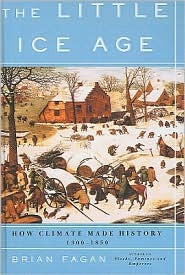

 |

|

The average rating for The Little Ice Age: How Climate Made History, 1300-1850 based on 2 reviews is 3 stars.
Review # 1 was written on 2020-07-08 00:00:00 Valerie Downs Valerie DownsI read this book years ago and was fascinated by all the examples that showed how climate has affected history. Published in 2000, this book put forth the case that the world went through "a little ice age" from 1300-1850, and before and after there was (and is) a warming period. I remembered reading that there were large fairs on the frozen Thames River from the late 1600s until Victorian times in the mid-19th Century. And what really stuck with me was that the increasing cold conditions doomed the Norse/ Viking colonies in Greenland and ended any chance of their colonizing at least a part of North America. I did a quick reread to refresh my memory on many of the details that Brian Fagan went into. One important point is that the time period he talks about was not uniformly colder over that time period. By 1400, weather had become more unpredictable with sudden temperature shifts culminating in the cold decades of the late 16th Century. There was a warmer period in the 18th Century, but then it became much colder in the 19th C. The most powerful chapter in the book I thought was about "the Great Hunger" in Ireland. Cold wet weather had destroyed grain crops in Ireland in the 18th C. and the Irish switched to the easily-grown potato. Their overdependence on potatoes proved to be fatal for many, when a fungus caused a potato blight. By 1851, the population fell from 8 million (in 1841) to 6.5 million. A million people emigrated and a million and a half died of famine and associated disease. Fagan points out that political decisions are important to consider. British governmental commitment to "the free market" meant only limited aid being sent to the starving Irish. The government did send troops to keep order, while thousands of bodies lay on the ground and inside the hovels because there was no one to bury them. After 1850, there was an overall warming of the planet, although there would still be some cold spells. Although there are natural climate cycles, Fagan makes it clear that human activity is the main cause of the increasing warming. An increase in agriculture in such places as North America and the Industrial Revolution, starting in Britain in the late 18th C., started raising the carbon dioxide level in the atmosphere, causing a "greenhouse effect." In order to prevent rising sea levels, increased storms, and severe droughts will mean we have to make some important political decisions. Fagan's conclusion is that we humans have always been vulnerable to the effects of climate and we need to learn the lessons from history. |
Review # 2 was written on 2020-10-18 00:00:00 Mary Clarke Mary ClarkeNot very good. I was disappointed. The topic was interesting, but the execution of the work was poor. It was at it’s best discussing the weather. The rest was just poorly organized drivel. The main flaw was organization. It seemed to jump around in time and place and weather. Along the way there were random paragraphs about climate tech which would have been better handled in an overview chapter at the beginning. The analysis is light, but there’s only so many ways one can say the harvest was good or bad and people had enough or starved. The mention of big historical events is in passing and not really related to climate. In short, this was a poorly conceived and organized book which would have benefited tremendously from better editing and a historian as co-author. Can’t recommend though worth checking out of the library if interested. |
CAN'T FIND WHAT YOU'RE LOOKING FOR? CLICK HERE!!!